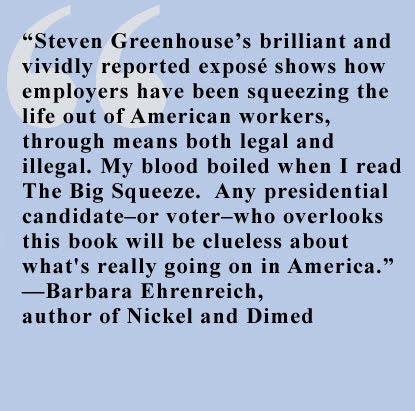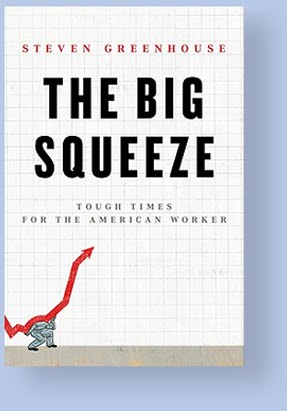The Big Squeeze book launched on April 15th. To order your book visit one of the following:
Amazon
Barnes & Noble
Borders
Powells
Random House
BOOK REVIEW
The Cleveland Plain Dealer was the first newspaper to review The Big Squeeze. This is what Karen Long, the newspaper's book editor, had to say in her review, which appeared on April 13.
''The Big Squeeze" offers a timely look at the plight of U.S. workers
by Karen Long
Mike Michell loved the adrenaline rush of catching shoplifters for the Wal-Marts in east Texas. He was a natural, too, nabbing 180 thieves in two years. But when he chased one into the store parking lot, her accomplice drove the getaway car over Michell, breaking off his left kneecap, crushing two discs in his spine and tearing his rotator cuff.
Wal-Mart fired Michell - he says to shed the cost of his workers' compensation. He spent two years in court fighting to force the company to cover his $20,000 back surgery, but finally, "injured, unemployed and with his resources dwindling," Michell gave up. Now the taxpayers of Texas, rather than Wal-Mart, will cover the bill.
This anecdote opens Steven Greenhouse's timely, important "The Big Squeeze: Tough Times for the American Worker." As well-made as a Shaker chair, this book does a remarkable job of explaining the weight accumulating in the chests of so many American wage earners, and the forces behind it.
Greenhouse is fair to Wal-Mart, which rates an entire chapter, and its chief executive officer, Lee Scott. But the labor reporter for The New York Times also notes that the nation's largest employer (with nearly 1.4 million on its payroll) scores a Brobdingnagian footprint on the labor landscape. And last year, it paid its average, full-time hourly worker $19,100 - some $1,500 below the poverty line for a family of four.
"One of the least examined but most important trends taking place in the United States today is the broad decline in the status and treatment of American workers - white-collar and blue-collar workers, middle-class and low-end workers - that . . . has left a broad swath of the American workforce on a lower plane than in decades past, with health coverage, pension benefits, job security, workloads, stress levels and often wages growing worse for millions of Americans," Greenhouse writes.
To read the rest of this review click here
RECENT NEWS
Subscribe to:
Post Comments (Atom)











No comments:
Post a Comment